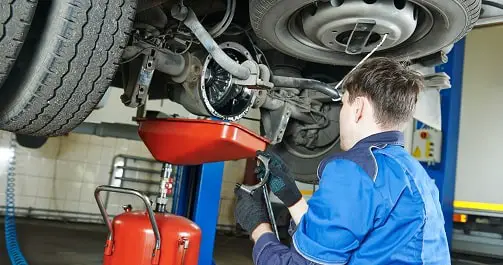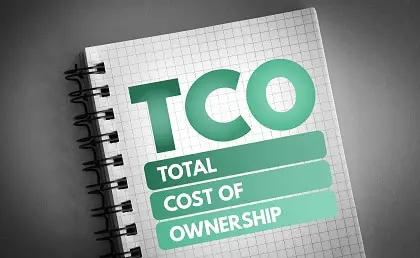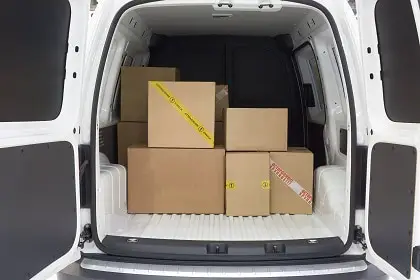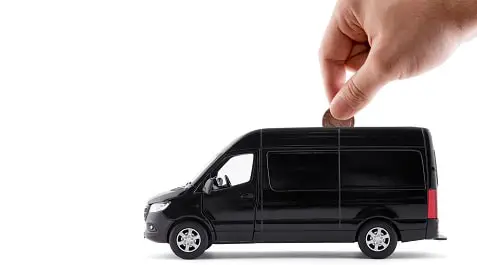Here is why a van can be a good investment:
From a business perspective, a van can be a good investment if you can use it to earn money in the long run. And even if put to non-commercial use, owning a van can be a worthwhile experience if it contributes to your overall happiness and good quality of life.
While purchasing and maintaining a van can leave a huge dent in your wallet, owning one isn’t necessarily a waste of money. And whether or not it turns into a financial sinkhole depends on what you’ll use it for and how.
If you’re still wondering whether a van is a good investment, I’ll help you throw your concerns out of the window through this detailed guide, which will help ensure you only get a van if it will be a good investment.
Let’s just get started, without leaving a stone unturned.
Why Owning a Van Can Be Rewarding
A savvy investor may tell you that a van does not appreciate in value, meaning you shouldn’t count on it as the best financial investment.
But that’s not a deal-breaker. There’s more to life than just saving or earning profit from everything you buy or sell.
And let’s be blunt – you can’t put a price on the happiness, strong familial relationships, freedom, memorable adventures, and fun that you’d enjoy with a van.
Vans Cost Money to Run, Not Just Buy
If you decide to invest in a van, you’ll quickly realize that the initial, operational, and maintenance costs add up.
They’re usually calculated on a cost per mile driven, or cost per year basis, and are vital for making personal and business decisions.
Here is a detailed breakdown of the true cost of owning a van:
1. Initial Cost
While there are plenty of van options to choose from, the initial cost depends on how you’ll fund the van.
If you decide to buy outright, you’ll need plenty of cash ranging from a couple of ten thousand bucks to several tens of thousands or even 100K+ depending on your preference.
The MSRP of a Ford Transit Connect passenger van is $27,920, for instance.
Cargo vans will cost you more, as will other full-size vans.
And if you’ve settled your heart on a camper van, expect to pay anything from $80,000 to about $125K for a full build.
If you go for the lease option, your upfront costs will reduce significantly, and the bigger your downpayment, the lower you’ll incur in monthly rentals.
Just don’t buy a super-expensive van on credit – it will likely take a huge toll on your debt to income ratio.
Lending institutions have a keen eye on this ratio to figure out if you have enough money that can reliably cover the cost of financing investments like houses, and property like vehicles.
2. Ownership Costs
Ownership costs are fixed, and you’ll incur them regardless of the miles you drive your van.
For example, if the annual ownership cost of your van is $10,000 and you drive it 20,000 miles per year, the cost is 0.5 cents per mile ($10,000/20000).
Van ownership costs include the following:
License and Insurance
These tend to be meager as compared to depreciation and interest. Regardless, you must account for them.
Pro Tip: Ask your accountant and get insurance quotes to investigate whether you need to invest in additional security features for your van and its cargo; as they might drive down your premiums.
Loan Interest
If you opt for a loan purchase, there’s much that goes into the interest, aside from the principal payment.
You get the interest cost by multiplying the outstanding debt by the interest rate. For a leased van, the lease payments replace the interest and depreciation.
Pro Tip: If you must take a loan for your van, be sure to get a reasonable loan quote so you won’t rack up excessive interest, or end up paying too much in terms of regular debt service compared to your disposable income.
Depreciation

Depreciation means the gradual reduction in the value of your van due to tear and wear, age, and obsolescence.
You’ll need to determine the buying price, the years for which you’ll own the van, and the ultimate sale or salvage value.
A brand new passenger van may cost you $24,905. If you own it for 5 years and then sell it at a market price of $17K, it’ll have depreciated annually by $1581.
Here’s the math: ($24,905- $17000)/5 = $1581.
If you expect the van to have 10,000 miles of use per year, the depreciation is about 16 cents per mile ($1581/10000 = $0.158). For a leased van, the interest plus depreciation swap places with the lease payments.
3. Running Costs
Running costs are variable because you only get to spend when you operate the van. They go in tandem with your mileage, and may include labor if you hire someone to operate your van.
The operating costs of your van include the following:
Fuel
The kind of van you drive determines how much you part with at the pump. Savvy auto owners prefer diesel to petrol as it yields higher miles per gallon, and is considerably cheaper.
By dividing the fuel cost per gallon by the miles per gallon, you get a good estimate for the cost of fuel per mile. You can easily figure out your fuel mileage by taking a sneak peek into the EPA fuel economy ratings.
Electric vans like the Nissan E-NV200, or the Ford E-Transit are ideal for shorter journeys, however much they’re eco-friendly and energy-efficient. The E-transit could give you 10 to 15 miles per charging hour.
Interestingly, the fuel equivalent of an electric van is the electricity cost. You can easily calculate this in terms of the dollar per kWh (kilowatt-hour), then divide it by the van’s efficiency, or electricity consumption per 100 miles.
Tires
Sounds trivial, but you need to calculate the cost of your tires per mile. Just divide the cost of a set of tires by their expected life in years.
Repairs and Maintenance

Perhaps these are the most difficult to estimate. Repair costs arise from regular maintenance, accidents, and wear and tear.
The best way to get your head around these is by using your previous expense records. You can easily infer whether your van’s repair costs are below or above average from a good record.
Without such records, however, you can still do some good reckoning from your average experience. The decade-old jalopy in your garage will likely have higher and less predictable repair costs.
Pro Tip: If you pay for your van’s repair and maintenance, account for both the labor and spares involved.
Labor Costs Add Up if You Are Paying a Driver
Assuming you’ll be using your van for business, be sure to include the cost of operator labor.
If you pay your operator per hour or miles driven, you’re looking at a variable cost. Simply divide the hourly wage by the average speed of the vehicle.
For example, if the driver gets paid $20 per hour for driving a cargo van and they go 50 miles in an hour, they get paid 4 cents per mile ($20 per hour/50 mph = $0.4 per mile).
Note that the number of hours an operator works is often more than the driving time, as they may also be engaged in loading and offloading.
If you hire your van driver by the month or year, we’re talking of a fixed labor cost, which you’ll still factor in as part of the running costs.
Determining the Total Costs

You can determine the total running cost by summing up the fuel, tires, labor, repairs, and maintenance costs.
You can also add up the depreciation, interest, license, and insurance costs to determine the total fixed ownership cost.
The Pros and Cons of Owning a Van
Some folks argue that these boxy cocoons on wheels aren’t the sleekest and coolest toys to own. But hey, they aren’t primarily designed for aesthetics.
Plus, what do you mean they aren’t cool when there’s a whole #VanLife community that’s enjoying a fantastic living and traveling trend in the US? I bet you’d also change your mind when you have a mammoth of a load to transport, which ordinarily won’t fit in a normal car boot.
A van proves its worth every time you use it, whether for business or personal use. And like any other vehicle, a van has its inherent downsides.
Let’s jump into these in detail.
The Benefits of Owning a Van

Vans offer the following advantages:
1. Optimal Size and Capacity
Vans optimize cargo space remarkably and are suited for various kinds of loads, making them win hands down over SUVs and trucks, for instance.
They can be ideal for cargo that needs to be stacked, wide and tall loads, etc.
And when it comes to family, nothing matters more than having space for everyone, including the kids, and your furry buddies.
Whether it’s a roomy passenger van like the GMC Savana, a crew van like the Mercedes-Benz Vito, a cargo van, or a custom camper, you have a rich variety of passenger and cargo options.
But if you’ll be carrying a load of cargo that needs restraint, or your outdoorsy adventures will take you offroad, I can’t help but think you’ll need a truck.
2. Vans Protect Cargo Really Well

An enclosed vehicle like a van offers numerous cargo protection features that are hard to beat. It’s raining hard, and you’re hauling groceries? No problem if you have a van.
Those cartons are stacked with fragile material, and you’d like to strap them down, or place them neatly in racks? A well-equipped crew van or cargo van will save you the trouble.
When it comes to material and cargo safety, you can easily throw your concerns into the wind, provided you lock that power sliding door or tailgate, rather than taking every valuable with you.
During my previous logistics job, I didn’t have to keep a close eye on the Nissan NV200 combi while grabbing a quick lunch with the boys. That’s something you’d only dream of with an open truck bed.
3. Easy Access and Use
Most vans have pretty simple and convenient access, and most people have a high opinion of sliding doors on the sides.
But even if you have barn doors or a lift-up tailgate, you can easily get items into and out of your van – a huge advantage for short people.
Seriously, a couple of my buddies at work didn’t enjoy reaching over to the side and into the cargo bed of their standard truck. That’s some trouble you wouldn’t experience with a van.
4. You Can Use It for Cargo, Passengers and Towing
With a van in your logistics arsenal, you can easily carry out those tasks for which you’d otherwise need a trailer or a truck.
Think about the many wheelbases, heights, and widths that most vans come in. A van like the 2021 Ford Transit offers three different lengths, three roof heights, and two wheelbases to accommodate your various load requirements.
You could have some seats with a bulkhead that leaves a substantial area behind for cargo, or it can be full of passenger seats, and still be a towing beast that pulls a loaded trailer.
You can put your van to commercial use, or you can customize it into a gorgeous living space. And as odd as it sounds, you can still use it to clear a bunch of rubbish.
5. They Have Lots of Upfit Options Upfit Options
Think of the tons of amazing ways you could upfit a van for a nice holiday accommodation, even if you don’t stay in it.
But that’s the tip of the iceberg. Ask any mobile plumber, electrician, HVAC specialist, or other professional that uses a van for their business, and they’ll tell you why they prefer vans to other vehicles.
One key reason is that vans have unrivaled customization options, and can be fitted with racks, shelves, cabinets, side ladders, and other features to accommodate various tools and equipment.
6. You Can Turn It Into a Camper Van
Not many vehicles can be transformed into a dazzling home on four wheels. But you can choose an appropriate van base, do some genius DIY on it, and presto – you have a motor home with a bed, fridge, TV, and everything else you can fit in.
The beauty of it is you can use a little help from YouTube. Better still, you can outsource the professional services of a company that builds camper vans in your state.
7. Cost Less Than a Truck
Most vans typically cost less than trucks with service bodies, and that’s great news for any budget. And when you drive a van as an everyday vehicle, you likely won’t need to purchase and run another vehicle.
Several brands and trims of vans make an ideal large family vehicle that comes in handy for those retreats, weddings, and church trips – no need for hiring.
What’s more, vans may not guzzle as much fuel compared to most trucks and SUVs, meaning you’ll likely save at the pump as long as you don’t need to go offroad.
8. You Can Use It for Lots of Jobs to Make Money From

Your van gives you a great shot at earning money through on-demand delivery, moving, towing, and taxi services.
You could choose from any of the following sites:
You could also rent out your van for the tip. Finally, you could sell it for a good lump sum when you feel it has served you long enough.
The Cons of Owning a Van

We could describe vans with all manner of glitz and doll-ups, but like all major vehicle purchase decisions, a van may not be the perfect choice for you.
Vans may have the following disadvantages:
1. They Have Less Power Than a Truck
While you can find a van with monster hauling and towing capacity, most vans have less power than their truck counterparts. That can be an issue if you intend to haul or pull heavy loads, or if you need some offroading.
2. Limited Crash Protection Features
It’s more difficult for a van to achieve a 5-star NHTSA crash test rating for both the passengers and driver protection. That’s a no-brainer since there’s much less of a crumple zone in front of the driver because of the engine position.
3. Larger Vans Cannot Fit In Many Parking Spaces
If you own a behemoth like the XLWB (extra-long wheelbase) Mercedes-Benz Sprinter, you’ll need to be careful in multi-storey car parks, and ensure the van will actually fit.
Additionally, most vans are appreciably long such that you’ll likely have fewer on-street parking slots. Just try snaking your way around with a 263.9-inch Ford Transit XLT and you’ll get what I mean.
These are issues you wouldn’t worry about with an average car or a standard truck.
4. Older Models Have Rear Visibility Issues
While newer vans come equipped with rearview cameras, a dinosaur like the Chevy Express, or some average crew van with an obscuring bulkhead presents an issue with rear visibility. Don’t just praise the side mirrors.
5. Less Tech Than Most Cars, Trucks & SUVs
With the exception of newer vans, most vans lag behind in technology compared to SUVs and modern trucks. Only a handful of them can boast noteworthy infotainment systems, driver-assist technology, and advanced safety features.
Additionally, the installation of features like air compressors in a van can prove tricky as they’re meant for trucks. If it’s a commercial van, workers may often complain about improper ventilation.
Conclusion
Generally, a van can be a good investment if it brings you cash flow or spices up the quality of your life. Regardless, a van is a notable example of a depreciating asset.
The ultimate answer to whether it’s good to invest in a van boils down to your financial priorities, how often you’ll use the van, and the unbeatable experiences you’ll enjoy in it.
If you’re ready to own one and can afford it really, make it happen, champ. Just be sure to create a safety net for maintenance and unforeseen expenses.

